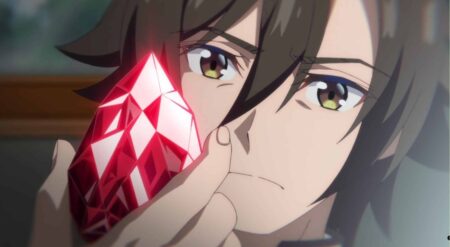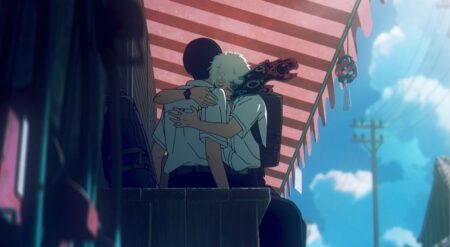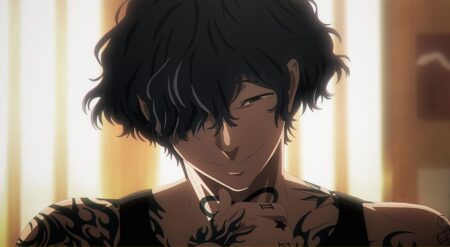
The Mobile Suit Gundam franchise is one of the oldest and most prestigious anime franchises and Mobile Suit Gundam: The Witch From Mercury is the latest in a long line of storied tales. Brought to life by Sunrise, The Witch From Mercury tells the story of Suletta Mercury and her part in a world full of corporate greed and oppression. Themes of grief and guilt play vital roles in the story and are told in a way that will resonate with every viewer.
Suletta starts off as a student at the Asticassia school where she meets the likes of Miorine Rembran and Guel Jeturk who play pivotal roles in her growth throughout the series. The first half of the season highlights just how broken the relationships between those from Earth and those from Space are and Suletta and her schoolmates represent various factions that have all been drawn into the hatred driven by the various corporations that exploit both Earthians and Spacians. The typical high-school-aged drama takes center stage at first, but the students are all quickly forced to deal with situations substantially more mature than kids their age should have to deal with.
That’s what The Witch From Mercury is at its core, a show about children being forced to be the adults in situations they played no part in causing. There is so much grief and pain that these kids had nothing to do with but they are left picking up the pieces all while trying to deal with their own trauma. Suletta is forced to take on the weight of her mother Prospera Mercury’s trauma after Prospera lost her firstborn daughter Ericht and her husband Nadim. Prospera’s grief causes her to set out for revenge against Miorine’s father Delling, the man who ordered the attack that killed her first family, and uses Suletta to do so.
The relationship between Suletta and Miorine is a vital one. Although Prospera hopes it will help her get closer to Delling, their relationship buds into a romantic one that ebbs and flows throughout the series. As they begin to see the consequences of their parent’s actions unfold they are forced to deal with it in ways that tested their resolve and their own relationship. I love seeing their interactions change as their grief and guilt magnified. Even more, I loved the way it resolved in the end in such a satisfying and authentic way. It’s rare to see an LGBTQ relationship of any kind in mecha anime franchises, so having one that was so thoughtfully done was very nice to see.

Suletta and Miorine are not the only ones who deal with grief, far from it. Guel’s life is so tragic that being responsible for his own father’s death might not even be the worst thing to happen to him. He witnesses horrific events on Earth that drive the plot forward in such a visceral way and brings the entire collection of heroes in The Witch From Mercury together to stop Prospera and the corporations hellbent on exploiting the weak and suffering.
The other bit players from Asticassia all deal with their fair share of suffering and the way they respond to their circumstances varies. Some, like Chuatury Panlunch, overcome their bias and personal experience to help Suletta in her just cause even when it seems like they won’t. Others, like Shaddiq Zenelli, fall into the arms of corporate greed and do unspeakable things to ruthlessly achieve their goals. Seeing these varying responses from different students is part of what makes The Witch From Mercury feel so real, so authentic. Not everyone is going to have an altruistic response to the evils that they face, so seeing some of them gravitate toward that evil was important.
In all of this, The Witch From Mercury wouldn’t be a Gundam series if it didn’t present some truly incredible mobile suit battles. Aerial, Suletta’s initial mobile suit, is the highlight of the series and plays important roles both on and off the battlefield. Seeing Aerial in action is always stunning, and the way Sunrise animated Aerial and the other mobile suits throughout the series is nothing short of immaculate. There is an exceptionally amazing battle sequence in the penultimate episode that pushes the boundaries of how great space battles between mobile suits can be while also driving an emotional stake into the hearts of viewers.

Augmenting the deeply emotional story and exceptional animation is a beautiful musical score by composer Takashi Ohmama. His musical creations amplify the battle scenes and had my heart racing amidst the actions, but it really shone through in the quieter moments. Somber piano melodies drew me into the emotionally connective moments and made me feel a part of the story, leaving me deeply impacted by both joyous and sorrowful moments in ways I never expected. Music can have a profound impact on the way we consume media and that is most evident in the way it serves the story in The Witch From Mercury.
The Witch From Mercury is a magnificent series that manages to break the hearts of viewers over and over again while also fighting hard to give hope. Authentic characters and deep themes all work alongside beautiful animation and a moving musical score to create a Mobile Suit Gundam series that will stick in the hearts and minds of viewers long after watching it.
Mobile Suit Gundam: The Witch From Mercury is available to stream on Crunchyroll.
Mobile Suit Gundam: The Witch From Mercury
-
Rating - 10/1010/10
TL;DR
Mobile Suit Gundam: The Witch From Mercury is a magnificent series that manages to break the hearts of viewers over and over again while also fighting hard to give hope. Authentic characters and deep themes all work alongside beautiful animation and a moving musical score to create a Mobile Suit Gundam series that will stick in the hearts and minds of viewers long after watching it.






